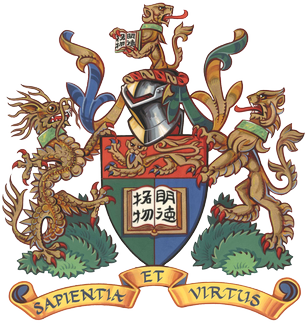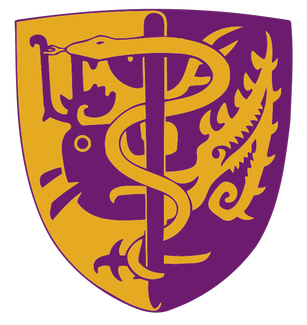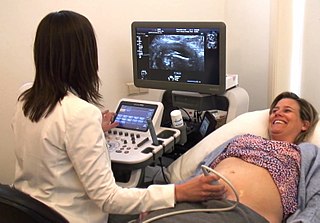Related Research Articles

A registered nurse (RN) is a nurse who has graduated or successfully passed a nursing program from a recognized nursing school and met the requirements outlined by a country, state, province or similar government-authorized licensing body to obtain a nursing license. An RN's scope of practice is determined by legislation, and is regulated by a professional body or council.

The University of Hong Kong (HKU) is a public research university in Pok Fu Lam, Hong Kong Island, Hong Kong.

The Nursing and Midwifery Council (NMC) is the regulator for nursing and midwifery professions in the UK. The NMC maintains a register of all nurses, midwives and specialist community public health nurses and nursing associates eligible to practise within the UK. It sets and reviews standards for their education, training, conduct and performance. The NMC also investigates allegations of impaired fitness to practise.
Nurse education consists of the theoretical and practical training provided to nurses with the purpose to prepare them for their duties as nursing care professionals. This education is provided to student nurses by experienced nurses and other medical professionals who have qualified or experienced for educational tasks, traditionally in a type of professional school known as a nursing school of college of nursing. Most countries offer nurse education courses that can be relevant to general nursing or to specialized areas including mental health nursing, pediatric nursing, and post-operative nursing. Nurse education also provides post-qualification courses in specialist subjects within nursing.
A licensed practical nurse (LPN), in much of the United States and Canada, is a nurse who provide direct nursing cares for people who are sick, injured, convalescent, or disabled. In the United States, LPNs work under the direction of physicians, mid-level practitioners, and may work under the direction of registered nurses depending on their jurisdiction.
A nurse educator is a nurse who teaches and prepares licensed practical nurses (LPN) and registered nurses (RN) for entry into practice positions. They can also teach in various patient care settings to provide continuing education to licensed nursing staff. Nurse Educators teach in graduate programs at Master's and doctoral level which prepare advanced practice nurses, nurse educators, nurse administrators, nurse researchers, and leaders in complex healthcare and educational organizations.
An Associate of Science in Nursing (ASN) is a tertiary education nursing degree which typically takes 2–3 years to complete. In the United States, this type of degree is usually awarded by community colleges or similar nursing schools. Some four-year colleges also offer this degree. Students awarded an Associate of Science in Nursing are qualified to sit for the NCLEX-RN and apply for licensure as a Registered Nurse.

Hong Kong Metropolitan University is a public university in Ho Man Tin, Kowloon, Hong Kong.
Modern medical education in Hong Kong started with the founding of the Hong Kong College of Medicine for Chinese in 1887. Currently, six institutes of higher education are engaged in the training of medical practitioners in Hong Kong.
Nursing in the United Kingdom is the largest health care profession in the country. It has evolved from assisting doctors to encompass a variety of professional roles. Over 700,000 nurses practice, working in settings such as hospitals, health centres, nursing homes, hospices, communities, military, prisons, and academia. Most are employed by the National Health Service (NHS).

Tsan Yuk Hospital is maternity hospital is located on 30 Hospital Road, Sai Ying Pun on Hong Kong Island, is a public hospital in Hong Kong, It was specialising in obstetrics and gynaecology. It also operates as a teaching and training hospital for the medical and nursing students of Li Ka Shing Faculty of Medicine of the University of Hong Kong.

Nursing in Australia is a health care profession. Nurses and midwives form the majority (54%) of Australian health care professionals. Nurses are either registered or enrolled. Registered nurses have broader and deeper education than enrolled nurses. Nurse practitioners complete a yet higher qualification. Nurses are not limited to working in hospitals, instead working in a variety of settings. Australian nurses are in demand as traveling nurses, particularly those with advanced qualifications.

Nursing in the United States is a professional health care occupation. It is the largest such occupation, employing millions of certified professionals. As of 2023, 3,175,390 registered nurses were employed, paid a median income of $86,070.

Nursing is a health care profession that "integrates the art and science of caring and focuses on the protection, promotion, and optimization of health and human functioning; prevention of illness and injury; facilitation of healing; and alleviation of suffering through compassionate presence". Nurses practice in many specialties with varying levels of certification and responsibility. Nurses comprise the largest component of most healthcare environments. Shortages of qualified nurses are found in many countries.
The 1988 Hong Kong Legislative Council election was an indirect election for members of the Legislative Council of Hong Kong (LegCo); was held on 22 September 1988. It was the second ever election of the Legislative Council in Hong Kong history based on the 1987 Review of Developments in Representative Government, as the Government's democratisation process according to the agreement of the Sino-British Joint Declaration. There were 12 members elected by Electoral Colleges, 14 members from functional constituencies.

The Faculty of Medicine of the Chinese University of Hong Kong is the medical school of the Chinese University of Hong Kong. It was established in 1981 and consists of five schools which offer an array of undergraduate and postgraduate programmes in the field of medicine, nursing, pharmacy and public health. The Hong Kong's Prince of Wales Hospital is the faculty's teaching facility and base of research. CUHK is a bilingual university; in general, courses are taught in English and/or Chinese.

Tung Wah College is a private, self-financing college in King's Park, Kowloon, Hong Kong. It was established by the Tung Wah Group of Hospitals in 2010 and registered under the Post-Secondary Colleges Ordinance.
The history of nursing in the United Kingdom relates to the development of the profession since the 1850s. The history of nursing itself dates back to ancient history, when the sick were cared for in temples and places of worship. In the early Christian era, nursing in the United Kingdom was undertaken by certain women in the Christian Church, their services being extended to patients in their homes. These women had no real training by today's standards, but experience taught them valuable skills, especially in the use of herbs and folk drugs, and some gained fame as the physicians of their era. Remnants of the religious nature of nurses remains in Britain today, especially with the retention of the job title "Sister" for a senior female nurse.

A midwife is a health professional who cares for mothers and newborns around childbirth, a specialization known as midwifery.

The Association of Licentiates of Medical Council of Hong Kong (ALMCHK) is an independent, non-profit, professional medical organisation established in 1995 representing the licentiate doctors in Hong Kong. It is the first of its kind designated for all non-local graduated licentiate doctors in Hong Kong. Membership are designated to registered doctors in Hong Kong who obtained LMCHK. The primary objective is to safeguard the welfare and rights of licentiates doctors. It is also one the few CME programme providers accredited by the Medical Council of Hong Kong (MCHK).
References
- ↑ Cap. 164 § 3 (1)
- ↑ "Mission Statement". The Nursing Council of Hong Kong. Retrieved 7 March 2018.
- ↑ "Hong Kong Legislative Council" (PDF). Hong Kong Legislative Council. 29 January 1931.
- ↑ Cap. 164 § 3 (2)
- 1 2 "Registration and Enrolment Requirements". The Nursing Council of Hong Kong. Retrieved 4 August 2020.
- 1 2 3 鍾志民. "護理專業". Student.hk (in Chinese (Hong Kong)). Retrieved 4 August 2020.
- ↑ "Higher Diploma in Nursing". Hospital Authority. Retrieved 4 August 2020.
- ↑ "Pre-service Nursing Programmes accredited by the Nursing Council of Hong Kong" (PDF). The Nursing Council of Hong Kong. Retrieved 7 March 2018.
- ↑ Cheng, Kris (13 February 2020). "Coronavirus: Unions urges medics to halt work if Hong Kong Hospital Authority cannot provide adequate protective gear". Hong Kong Free Press. Retrieved 4 August 2020.
- ↑ "護協簡介". Association of Hong Kong Nursing Staff (in Chinese (Hong Kong)). Retrieved 4 August 2020.
- 1 2 "Coronavirus: Hong Kong's Hospital Authority targets medics who went on strike to urge border closure". Hong Kong Free Press HKFP. 27 February 2020. Retrieved 4 August 2020.
- ↑ "Statistics". The Nursing Council of Hong Kong. Retrieved 4 August 2020.
- ↑ "公院醫護流失率6% 最少8年新高 去年逾千護士辭職 95%初級". Ming Pao (in Chinese (Hong Kong)). 18 March 2019.
- ↑ "2010 Health Manpower Survey: Summary of the Characteristics of Registered Nurses Enumerated". Department of Health. September 2011. Retrieved 4 August 2020.